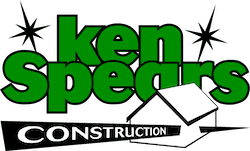When envisioning your remodeling plan and your floors, you may wonder about the best option for your home. The answer depends on your personal style, lifestyle, goals, personal preferences, and budget. There are more flooring options on the market than there have ever been before.
One of the most popular flooring options is hardwood flooring. But there are two options when it comes to hardwood flooring, solid and engineered. Ken Spears Construction discusses the similarities and differences between solid hardwood and engineered hardwood flooring. We also share more about the care, cost, and installation methods for both.
The Similarities
Both solid and engineered floors start with natural hardwood. They are also both beautiful options available in various styles and shades. The two options are durable and easy to maintain. You can find both unfinished to choose your custom stain and surface texture.
The Differences
Let’s cover the differences between solid and engineered flooring. We will start by dispelling the myth that engineered flooring is “fake wood.” Engineered hardwood is topped with a layer of wood with a variety of woods laminated together, offering excellent stability. It is commonly factory finished, receiving several coats of finish.
Engineered hardwood flooring doesn’t need a plywood subfloor beneath it; concrete will suffice. Installed in layers lying perpendicular to one another, it expands and contracts less than solid hardwood flooring.
Of course, solid hardwood is just that – solid wood. Solid flooring is available in long planks of hardwood. There are tongues and grooves on opposite edges to interlock during installation.
Solid wood can be re-sanded several times over the life of the flooring. The boards of solid flooring are narrower than engineered flooring boards. Solid hardwood expands and contracts considerably more.
Resistance to Moisture & Temperature
Hardwood floors can be affected by the environment around them. After all, they are wood. This natural material will react to changes in the environment even while lying on the floors of your home.
Both solid and engineered flooring are relatively resistant to heat. Engineered hardwood performs better in humid environments, making it less likely to warp. This makes it a good choice for basements, moist areas, or atop concrete. Engineered hardwood floors have a multi-ply design that allows the wood to expand.
Solid hardwood works best when installed away from wet areas like the bathroom or kitchen. While engineered hardwood flooring is more resistant to water, you should keep it dry. You should clean up spills immediately.
Caring for Solid and Engineered Floors
Solid hardwood and engineered hardwood floors are both easy to clean with a broom and a vacuum cleaner. When they need mopping, you must use a cleaner approved for wood flooring. Sweep your hardwood floors each day and vacuum them weekly. Every month you should clean your floors with a wood floor cleaner. Keep your hardwood floors in good shape by refinishing them at least every five years.
Durability and Maintenance Needs
Solid hardwood wins out in this department as it can be sanded and refinished many times. While you can refinish engineered hardwood, you can only do this twice at most. When it comes to finishing, prefinished hardwood is best as the finish applied at the factory holds up well.
If you should need to replace a single board of your solid hardwood flooring, it’s pretty simple. It’s not so easy with engineered flooring as it can be hard to match the exact finish of the rest of the flooring.
Ease of Installation
Engineered hardwood floors can be installed with the nail-down method or click-lock method when installed as a floating floor. Engineered floors are glued down when installed atop concrete.
Cost Comparison
You can purchase prefinished solid hardwood for $4 to $12 per square foot. Engineered hardwood flooring is available for $2.50 to $10 per square foot. Installation adds $3 to $10 per square foot.
Longevity
Hardwood flooring lasts longer than most flooring. Solid hardwood will last about thirty years, and some can go the extra mile, reaching 100 years since it can be sanded and refinished many times. Engineered hardwood flooring commonly lasts 25 years when properly maintained. And although you cannot refinish them as often as solid hardwood floors, the planks can be replaced relatively easily.
Call the Remodeling Pros at Ken Spears Construction!
You have an excellent starting place now that you have all the details about solid versus engineered flooring. But before you decide, it’s best to have a professional visit your home to offer their expert advice and a recommendation. Call Ken Spears Construction at 815-756-9779 or request a consultation to discuss your flooring options and DeKalb area remodeling project.



